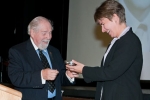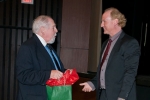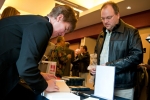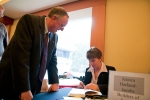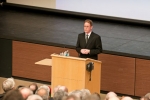2011 Lecture – Global Fraternalism: Canadian Freemasons, the British Empire, and the World

Dr. Jessica Harland-Jacobs
Associate Professor – University of Florida – Department of History
Jessica Harland-Jacobs is an associate professor in the Department of History at the University of Florida in Gainesville, Florida. After an international upbringing, she attended Cornell University, where she received her BA in history in 1992. She received her MA and PhD (2000) from Duke University, where she studied British, Imperial, and Canadian history and historical geography. Her first book, Builders of Empire: Freemasonry and British Imperialism, 1717-1927, was published by the University of North Carolina Press in 2007. She has published articles in The Journal of British Studies, The Geographical Review and Atlantic Studies, and a new article will appear in the forthcoming volume of the Journal for Research into Freemasonry and Fraternalism.
While she continues to devote much of her time to researching, writing, and speaking about the history of Freemasonry, she is also working on a project investigating Catholics in the British Isles and British Empire in the decades after the Seven Years War. She is examining policies and attitudes on the part of the British toward Catholics, as well as the experiences of Catholics in old colonies like Ireland and ceded territories such as Grenada and Quebec.
Harland-Jacobs teaches courses on modern Britain and the British Empire, Ireland, Imperialism and the Atlantic world. She has won department, college, and university teaching awards and has served in several administrative positions including, currently, as Associate Chair of the Department of History.
Lecture Summary
This lecture opens with a call for using broad categories of analysis, including empire and world, in our studies of fraternalism and Canadian history. Doing so allows us to appreciate the extent and impact of Freemasonry, especially the signi?cant role it played in the history of globalization and empire building. The lecture is divided into three parts: ?rst, a general discussion of globalization and its relationship to imperialism; second, an examination of Freemasonry’s contribution to the history of globalization in the period between the 1730s and the 1820s; and third, an exploration of several aspects of Freemasons, engagement with the British Empire during the modern period. While adopting a macro-level perspective, the talk uses examples from Canadian masonic history, particularly Upper Canada, to illustrate its central claims and to demonstrate the complex ways fraternal organizations operate at the intersection of the local and the global.
To see the poster for this event, please click here.
Photos
Please click thumbnails to view photos.







